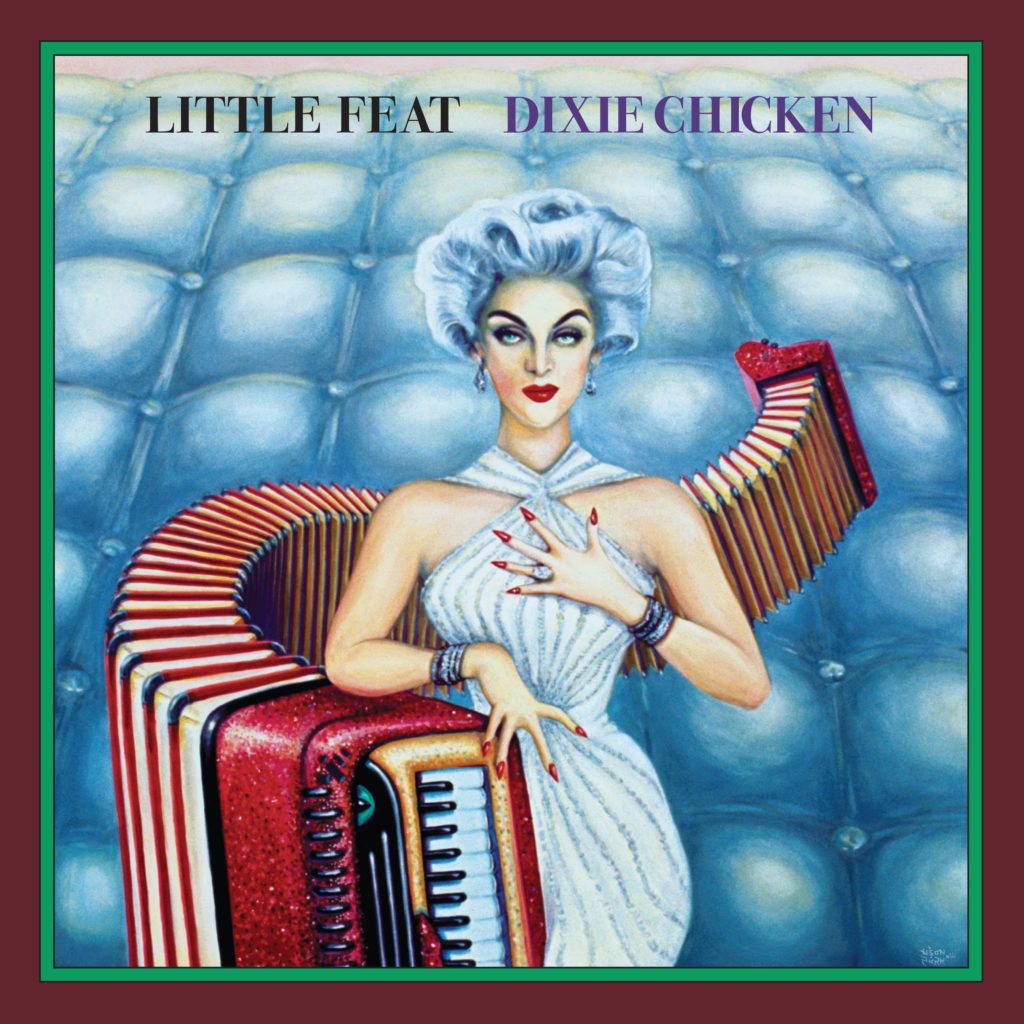
Once musicians saw the storytelling possibilities inherent in the expanded canvas offered by the album, making a great one became an artistic goal. But the album still had to sell for musicians (and record labels) to go on. Little Feat had neither hit singles nor a best-selling album and yet they remain a much beloved band, a point made clear yet again by a pair of recent reissues of their two finest studio albums, Sailin’ Shoes and Dixie Chicken.
For many, the main reason Little Feat remains important lies in the fact that the band was the home of creative whirlwind Lowell George. A show biz kid from Los Angeles whose father was furrier to the stars, George, as his childhood friend Martin Kibbee, put it, “…was born under a bad sign—the Hollywood sign.” A skilled flute player in high school, George moved to guitar and in 1965 formed his first band, The Factory. Although they made a pair of hilarious appearances on 1960’s TV series Gomer Pyle U.S.M.C. and F Troop—the last as “The Bedbugs”—the band never broke through and by 1968 George had joined Frank Zappa’s Mothers of Invention. Leaving the Mothers the next year, George joined with Mothers bassist Roy Estrada, keyboardist Bill Payne, and drummer Richie Hayward to form Little Feat, whose name was deliberately misspelled in tribute to the spelling of The Beatles.
After signing with Warner Brothers in 1970, Little Feat released a self-titled first album that, despite catching the ears of a few critics, did not sell (11,000 copies) and had Warner teetering on a decision to drop the band. Their forward-looking, unclassifiable mix of rock, country, soul, and folk proved hard for listeners to digest. But, encouraged by songwriter Van Dyke Parks and specifically a pair of new songs, “Easy to Slip” and “Sailin’ Shoes,” the label greenlighted a follow-up. That collection, Sailin’ Shoes, and the album that followed, Little Feat’s finest moment on record, Dixie Chicken, have now been remastered and reissued by Rhino Records to celebrate the albums’ 50th anniversary. Happily, these are reissues done right. Both albums have been remastered by Dan Hersch and Bill Inglot at L.A.’s D2 Mastering. The lacquers were cut at Bernie Grundman Mastering and the LPs were pressed in good but not great quality at GZ in the Czech Republic. While the sound of both records is brighter and the sonic image larger than on previous pressings, these 2023 reissues, also available as CDs, each contain an extra LP of outtakes, alternate takes, and demos, and another full LP that captures an unreleased live set corresponding to when the album in question was first released.
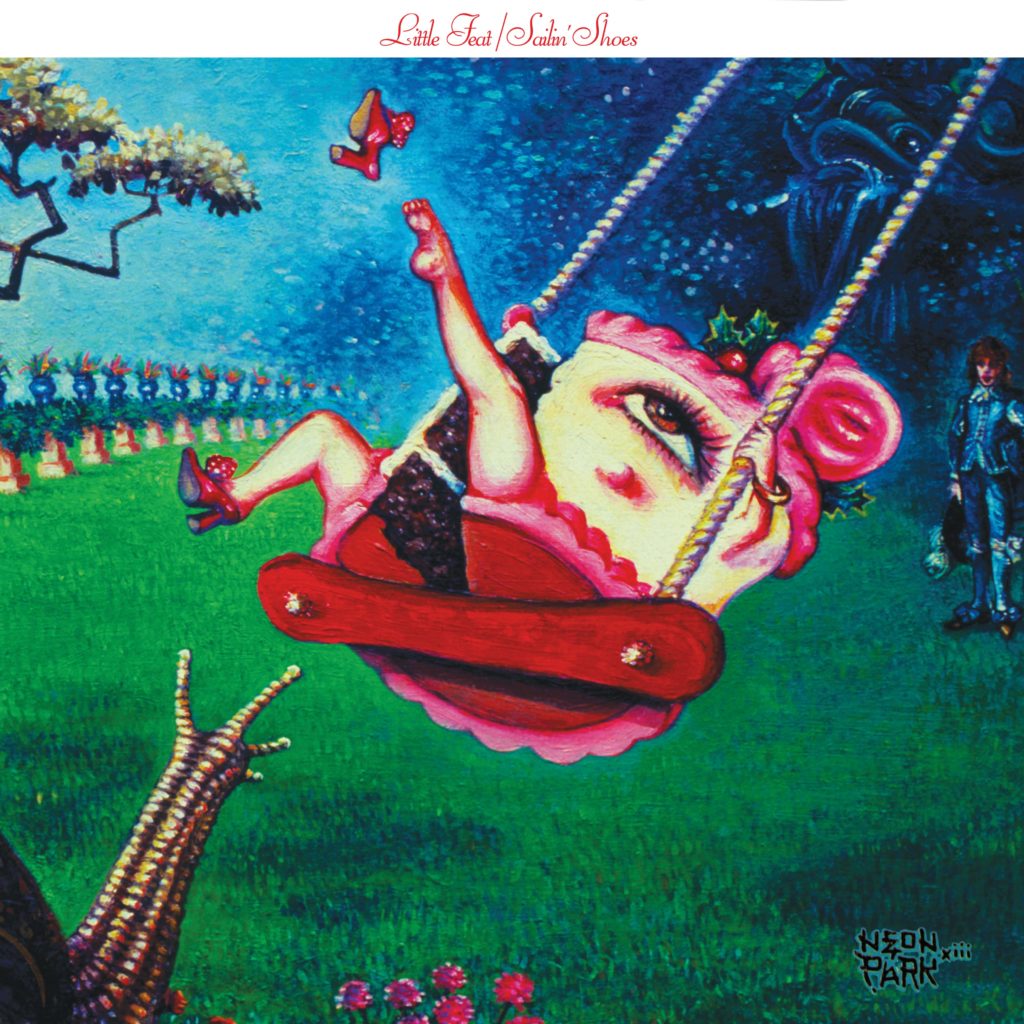
Graced with a fantastical cover image by famed illustrator Neon Park that included Mick Jagger as Gainsborough’s The Blue Boy, Sailin’ Shoes was the sound of a band coming into focus. Produced by Warner’s Ted Templeman and engineered mostly by Donn Landee, Sailin’ Shoes has a sharper production style than the band’s debut. While all four members were obviously talented musicians, George’s songwriting has now clearly become the vision. Opening with “Easy to Slip”, a co-write between George and his high school friend and Factory bandmate Kibbee, the album moves from one strength to another. Odd time signatures abound. The songs are often strangely structured. The otherwise sweet “Trouble”, which contains some of George’s most tender singing, just stops before any build up. Although it appeared on the band’s self-titled debut, the re-recording here of George’s “Willin’,” a tune so good that mentor Frank Zappa suggested George form his own band to record it, is the classic studio rendition and the sort of cosmic country number that was, despite the band’s rep as a jammy monster, a George specialty. George sings the first verse before a chorus where, armed with his immortal trinity of “weed, whites and wine”, he’d be… willin’. “A Apolitical Blues,” is a slow blues goof where George growls “Well my telephone was ringing/And they told me it was Chairman Mao,” before concluding in the last verse, “I don’t care if it’s John Wayne/I just don’t wanna talk to him now”. Lastly, there’s the band’s wonderfully out of character “Teenage Nervous Breakdown,” a jumpy, effective precursor to the punk and New Wave musical revolutions to come. The outtakes/alternates second LP of this reissue features the demo of “Easy to Fall”, the odd half instrumental “Roto/Tone”, and the left-on-the-shelf “Doriville.” All of what’s on these studio artifacts outtakes/alternates LP of both albums has been previously released on the 2000 4-CD boxed set, Hotcakes & Outtakes, but it’s still nice to now have them on LP. An alternate take of “Willin’” focuses even tighter on George’s voice. It’s interesting to compare that very serious version to the livelier take on the third LP here, recorded at the Palladium in Los Angeles in August 1971, that George introduces as “country and western music.” This live set, which closes with a suitably frantic “Teenage Nervous Breakdown”, has no sound issues and should offer fans plenty to enjoy.
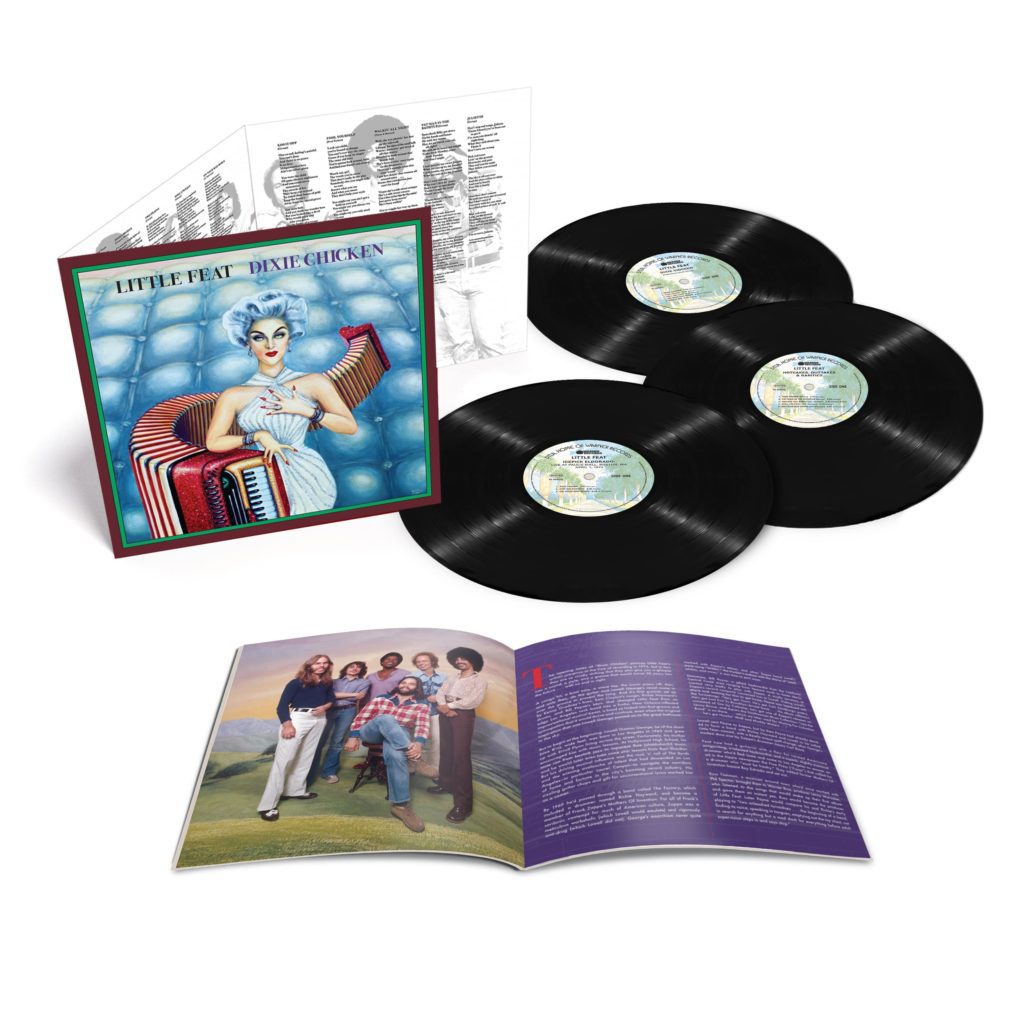
When Sailin’ Shoes failed to generate any meaningful sales, bassist Roy Estrada decided to leave the band to join Captain Beefheart who was having more success at that point than Little Feat. Sometimes subtraction leads to beneficial addition and in this case, Kenny Gradney replaced Estrada. Also joining were percussionist Sam Clayton, brother of singer Merry Clayton, and George’s high school friend guitarist Paul Barrere. The move from quartet to sextet, with Barrere and Clayton also adding vocals, broadened the band’s sound which had now turned squarely towards funky New Orleans-inspired grooves. It’s a great testament to the Mo Ostin/Lenny Waronker regime at Warner Bros. Records, one that valued allowing artists to grow and build a catalog of recordings, that the band was given a robust recording budget despite its anemic album sales. They even let George produce this time out, with Robert Appère and Michael Boshears as engineers. From the first bars of the title track that opens the album, it’s clear this is going to be a much funkier ride. George not only produced the album but also contributed six of the album’s ten songs and the majority of the lead vocal parts. By this time, George had also become respected as a very skilled slide guitarist, which he immediately employs on “Dixie Chicken” and its follow-up, “Two Trains.” He adds another acoustic number in the vein of “Willin’” in “Roll Um Easy.” Cementing the connection to the Crescent City is the cover of Allen Toussaint’s “On Your Way Down”. In “Kiss It Off”, George’s lyrics go cosmic—“You were the child of some electric nightmare/And you could move mountains, the swords of fire/They keep you around to watch their house of gold/Keep the hungry away from the sacred grove.” The Barrere/Payne co-write “Walkin’ All Night” keeps the spirit going before George returns with the anthemic slide guitar showcase, “Fat Man in The Bathtub”. Neon Park again contributed the unforgettable cover art. Guests on the album include Bonnie Bramlett, Bonnie Raitt, and Danny Hutton (Three Dog Night), all on backing vocals.
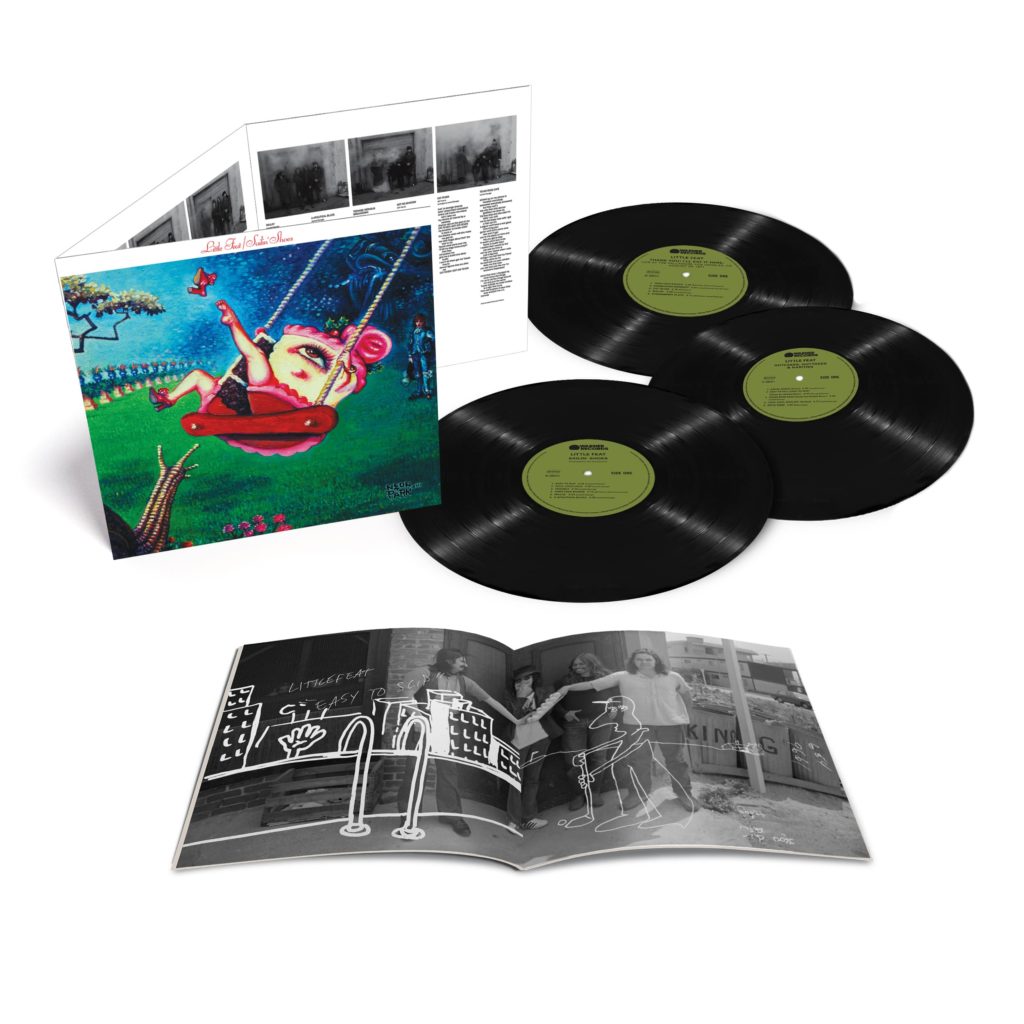
While the outtake/alternate disc on Sailin’ Shoes contains nothing unreleased, the demo of “Fat Man in the Bathtub,” with just George singing and playing guitar, is still appropriately raw. A rejected instrumental jam, “Eldorado Slim,” again first issued on the Hotcakes & Outtakes, is worth a listen. The third LP featuring a seven-song concert from April 1973 at Paul’s Mall in Boston captures some of the band’s legendary live energy, though on some tracks like “Got No Shadow”, there are sound issues with the vocal tracks. After Dixie Chicken, Lowell George began to drift away from the band, intent on making his own solo album (1979’s Thanks I’ll Eat It Here) before eventually succumbing to personal demons at the age of 34 in 1979. Only financially successful late in its career, but now revered for their fearless mixing of genres, Little Feat is emblematic of a pre-streaming time when players were unafraid—and given leeway—to find their own sound. As proof that George and Feat found artistic success, both Sailin’ Shoes and Dixie Chicken, freshly remastered, sound as relevant today as they did 50 years ago.


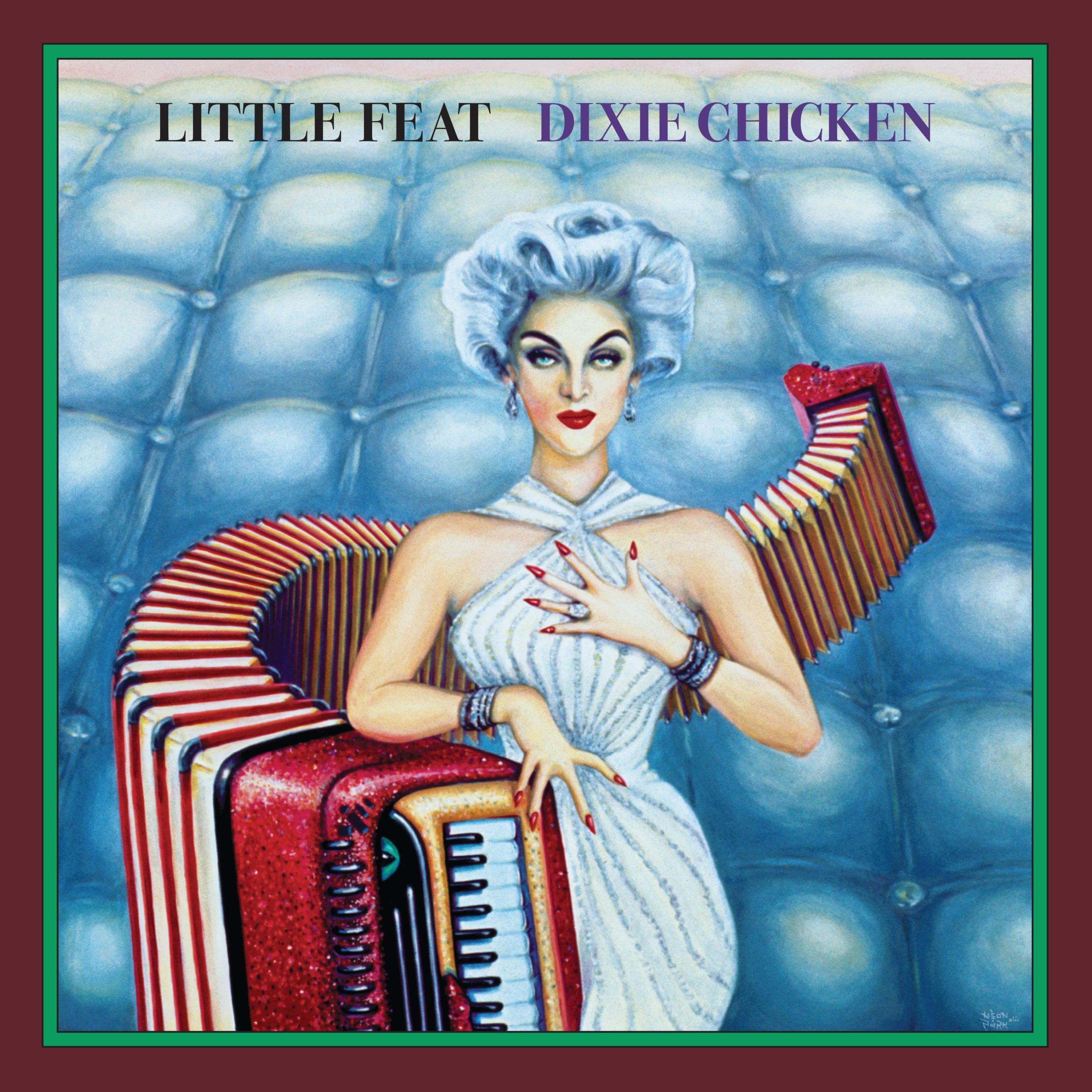


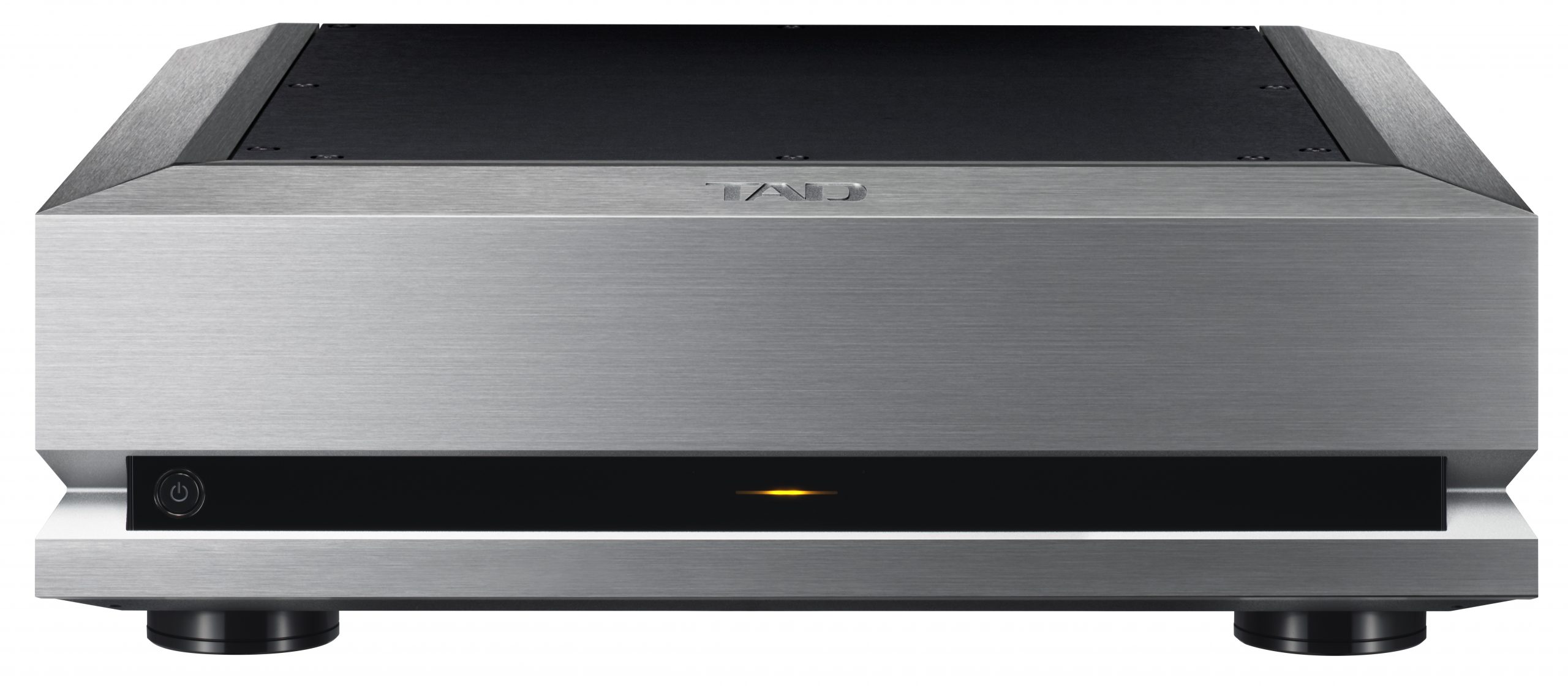




Leave a Reply